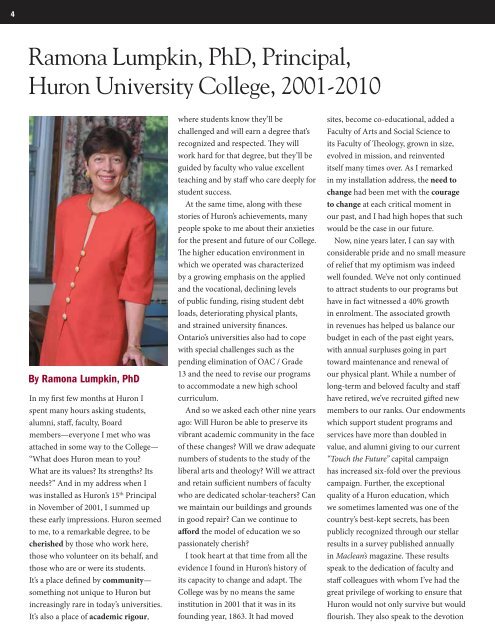Ramona Lumpkin, PhD Principal, Huron University College 2001 ...
Ramona Lumpkin, PhD Principal, Huron University College 2001 ...
Ramona Lumpkin, PhD Principal, Huron University College 2001 ...
You also want an ePaper? Increase the reach of your titles
YUMPU automatically turns print PDFs into web optimized ePapers that Google loves.
4<br />
ramona lumpkin, Phd, <strong>Principal</strong>,<br />
<strong>Huron</strong> <strong>University</strong> college, <strong>2001</strong>-2010<br />
By <strong>Ramona</strong> <strong>Lumpkin</strong>, <strong>PhD</strong><br />
In my first few months at <strong>Huron</strong> I<br />
spent many hours asking students,<br />
alumni, staff, faculty, Board<br />
members—everyone I met who was<br />
attached in some way to the <strong>College</strong>—<br />
“What does <strong>Huron</strong> mean to you?<br />
What are its values? Its strengths? Its<br />
needs?” And in my address when I<br />
was installed as <strong>Huron</strong>’s 15 th <strong>Principal</strong><br />
in November of <strong>2001</strong>, I summed up<br />
these early impressions. <strong>Huron</strong> seemed<br />
to me, to a remarkable degree, to be<br />
cherished by those who work here,<br />
those who volunteer on its behalf, and<br />
those who are or were its students.<br />
It’s a place defined by community—<br />
something not unique to <strong>Huron</strong> but<br />
increasingly rare in today’s universities.<br />
It’s also a place of academic rigour,<br />
where students know they’ll be<br />
challenged and will earn a degree that’s<br />
recognized and respected. They will<br />
work hard for that degree, but they’ll be<br />
guided by faculty who value excellent<br />
teaching and by staff who care deeply for<br />
student success.<br />
At the same time, along with these<br />
stories of <strong>Huron</strong>’s achievements, many<br />
people spoke to me about their anxieties<br />
for the present and future of our <strong>College</strong>.<br />
The higher education environment in<br />
which we operated was characterized<br />
by a growing emphasis on the applied<br />
and the vocational, declining levels<br />
of public funding, rising student debt<br />
loads, deteriorating physical plants,<br />
and strained university finances.<br />
Ontario’s universities also had to cope<br />
with special challenges such as the<br />
pending elimination of OAC / Grade<br />
13 and the need to revise our programs<br />
to accommodate a new high school<br />
curriculum.<br />
And so we asked each other nine years<br />
ago: Will <strong>Huron</strong> be able to preserve its<br />
vibrant academic community in the face<br />
of these changes? Will we draw adequate<br />
numbers of students to the study of the<br />
liberal arts and theology? Will we attract<br />
and retain sufficient numbers of faculty<br />
who are dedicated scholar-teachers? Can<br />
we maintain our buildings and grounds<br />
in good repair? Can we continue to<br />
afford the model of education we so<br />
passionately cherish?<br />
I took heart at that time from all the<br />
evidence I found in <strong>Huron</strong>’s history of<br />
its capacity to change and adapt. The<br />
<strong>College</strong> was by no means the same<br />
institution in <strong>2001</strong> that it was in its<br />
founding year, 1863. It had moved<br />
sites, become co-educational, added a<br />
Faculty of Arts and Social Science to<br />
its Faculty of Theology, grown in size,<br />
evolved in mission, and reinvented<br />
itself many times over. As I remarked<br />
in my installation address, the need to<br />
change had been met with the courage<br />
to change at each critical moment in<br />
our past, and I had high hopes that such<br />
would be the case in our future.<br />
Now, nine years later, I can say with<br />
considerable pride and no small measure<br />
of relief that my optimism was indeed<br />
well founded. We’ve not only continued<br />
to attract students to our programs but<br />
have in fact witnessed a 40% growth<br />
in enrolment. The associated growth<br />
in revenues has helped us balance our<br />
budget in each of the past eight years,<br />
with annual surpluses going in part<br />
toward maintenance and renewal of<br />
our physical plant. While a number of<br />
long-term and beloved faculty and staff<br />
have retired, we’ve recruited gifted new<br />
members to our ranks. Our endowments<br />
which support student programs and<br />
services have more than doubled in<br />
value, and alumni giving to our current<br />
“Touch the Future” capital campaign<br />
has increased six-fold over the previous<br />
campaign. Further, the exceptional<br />
quality of a <strong>Huron</strong> education, which<br />
we sometimes lamented was one of the<br />
country’s best-kept secrets, has been<br />
publicly recognized through our stellar<br />
results in a survey published annually<br />
in Maclean’s magazine. These results<br />
speak to the dedication of faculty and<br />
staff colleagues with whom I’ve had the<br />
great privilege of working to ensure that<br />
<strong>Huron</strong> would not only survive but would<br />
flourish. They also speak to the devotion


